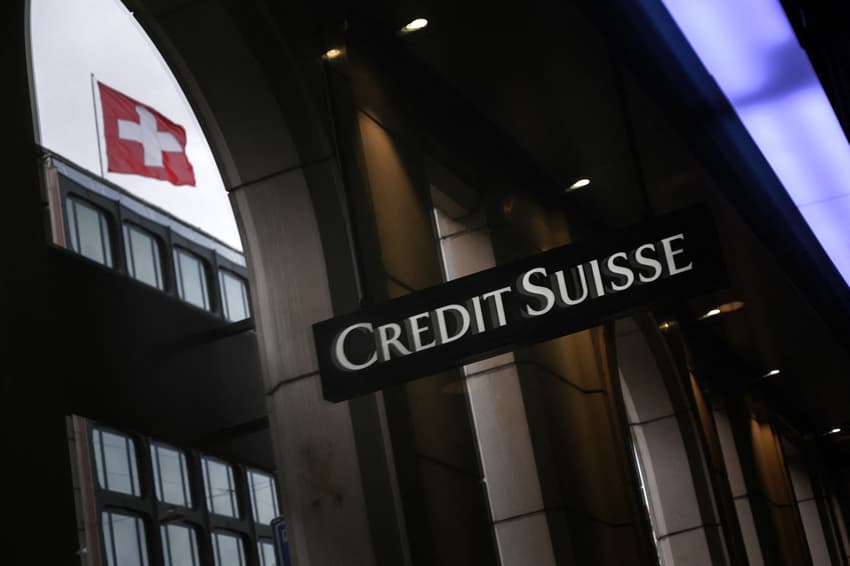No need to boost Switzerland's press freedoms: parliamentary committee

A Swiss parliamentary committee on Friday rejected calls to overhaul banking secrecy rules that critics warn stifle free speech in the country.
Switzerland's commitment to press freedom has been questioned since it was revealed that no Swiss media had dared participate in an international media investigation into the dealings of Credit Suisse.
The vast "Suisse Secrets" investigation by dozens of media organisations from around the world claimed in February that leaked data revealed how Switzerland's second largest bank held more than $8 billion in accounts of criminals, dictators and rights abusers.
Credit Suisse flatly rejected the "allegations and insinuations" in the probe.
While the investigation focused on the bank's alleged handling of dirty money, it also shone a spotlight on Article 47 of Switzerland's Banking Act, which critics say has weakened media freedom in the country.
READ ALSO: ‘Swiss Secrets’: What would EU blacklisting mean for Switzerland?
Experts say the 2015 law, which made it a criminal offence to reveal leaked banking data punishable with up to five years in prison, effectively silences insiders or journalists who may want to expose wrongdoing within a Swiss bank.
Risk 'too big'
So while 48 media companies from around the world participated in the Suisse Secrets investigation, no Swiss news media took part due to the risk of criminal prosecution.
"The judicial risk is simply too big," the large Tamedia media group, which has taken part in previous international data leak investigations, acknowledged at the time.
The United Nations' top expert on freedom of expression, Irene Kahn, wrote to the Swiss government in March to voice her concerns about the law.
"The Swiss banking law is an example of the criminalisation of journalism," she said in an interview with the Tages-Anzeiger daily this week, warning that this could result in self-censorship.
Amid the criticism, the Economic Affairs and Taxation Committee of the Swiss parliament was asked to examine calls for an overhaul of the legislation.
After hearing arguments from the banking sector and from experts on financial crime and media rights, the committee members rejected the call to change the law, a parliamentary statement said Friday.
"The majority of the commission did not find it necessary to intervene at a legislative level," it said.
The committee, which is tasked with discussing and providing recommendations on issues before they are debated in the full parliamentary chamber, highlighted the progress made by Swiss banks in recent years in addressing money laundering and other economic crimes.
Now, "they are in line with international standards," the statement said.
It also cautioned that changing the law could result in "public accusations targeting individuals", without providing further details. And the committee members stressed that "no journalist had ever been convicted until now by a court of violating Act 47".
Comments
See Also
Switzerland's commitment to press freedom has been questioned since it was revealed that no Swiss media had dared participate in an international media investigation into the dealings of Credit Suisse.
The vast "Suisse Secrets" investigation by dozens of media organisations from around the world claimed in February that leaked data revealed how Switzerland's second largest bank held more than $8 billion in accounts of criminals, dictators and rights abusers.
Credit Suisse flatly rejected the "allegations and insinuations" in the probe.
While the investigation focused on the bank's alleged handling of dirty money, it also shone a spotlight on Article 47 of Switzerland's Banking Act, which critics say has weakened media freedom in the country.
READ ALSO: ‘Swiss Secrets’: What would EU blacklisting mean for Switzerland?
Experts say the 2015 law, which made it a criminal offence to reveal leaked banking data punishable with up to five years in prison, effectively silences insiders or journalists who may want to expose wrongdoing within a Swiss bank.
Risk 'too big'
So while 48 media companies from around the world participated in the Suisse Secrets investigation, no Swiss news media took part due to the risk of criminal prosecution.
"The judicial risk is simply too big," the large Tamedia media group, which has taken part in previous international data leak investigations, acknowledged at the time.
The United Nations' top expert on freedom of expression, Irene Kahn, wrote to the Swiss government in March to voice her concerns about the law.
"The Swiss banking law is an example of the criminalisation of journalism," she said in an interview with the Tages-Anzeiger daily this week, warning that this could result in self-censorship.
Amid the criticism, the Economic Affairs and Taxation Committee of the Swiss parliament was asked to examine calls for an overhaul of the legislation.
After hearing arguments from the banking sector and from experts on financial crime and media rights, the committee members rejected the call to change the law, a parliamentary statement said Friday.
"The majority of the commission did not find it necessary to intervene at a legislative level," it said.
The committee, which is tasked with discussing and providing recommendations on issues before they are debated in the full parliamentary chamber, highlighted the progress made by Swiss banks in recent years in addressing money laundering and other economic crimes.
Now, "they are in line with international standards," the statement said.
It also cautioned that changing the law could result in "public accusations targeting individuals", without providing further details. And the committee members stressed that "no journalist had ever been convicted until now by a court of violating Act 47".
Join the conversation in our comments section below. Share your own views and experience and if you have a question or suggestion for our journalists then email us at [email protected].
Please keep comments civil, constructive and on topic – and make sure to read our terms of use before getting involved.
Please log in here to leave a comment.